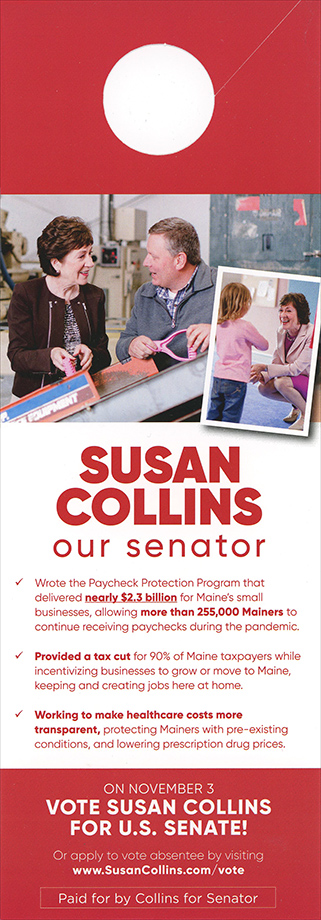- Main
Page « 2020
Senate Races «
Maine
Senate
| MAINE |
Nov. 3,
2020
Senate
|
|
Plurality: 70,422 votes (8.59 percentage points). ME
Secretary of State
Notes: Sen. Susan Collins (R) won an historic fifth term, defeating House Speaker Sara Gideon (D) and two independent candidates. At the same time, Biden-Harris defeated Trump-Pence in Maine by 435,072 votes (53.09%) to 360,737 (44.02%). Collins had a reputation for bipartisanship. In May 2020 her office highlighted a study by the Lugar Center and The McCourt School of Public Policy at Georgetown University ranking her as the most bipartisan Senator for seven consecutive years; further, the group said her 2019 Bipartisan Index score was the highest it had ever recorded. However, Collins supported the controversial Tax Cuts and Jobs Act, approved by the Senate in a 51-48 vote on Dec. 20, 2017. Collins earned the ire of liberal groups with her decision to support President Trump's nomination of Brett Kavanaugh to the U.S. Supreme Court; she explained her decision in an Oct. 5, 2018 floor speech that was disrupted by spectators in the gallery (>). Collins formally launched her campaign in a Dec. 18, 2019 email, asking "in today’s polarized political environment, is there still a role for a centrist who believes in getting things done through compromise, collegiality, and bipartisanship?” Gideon was elected to the Freeport Town Council in Oct. 2009 and the Maine House of Representatives in 2012. She became Speaker in 2016. She announced her candidacy on June 24, 2019 (>), and the DSCC endorsed her the next day. Also running in the Democratic primary were activist, organizer and small business owner Betsy Sweet, who had support of a number of progressive groups, and attorney and activist Bre Kidman. Gideon won the July 14 primary with over 70-percent of the vote. Collins did not face a primary challenge. Two independent candidates hoped that Maine's ranked choice voting system would give them a chance in the election. Lisa Savage, a recently retired teacher from Saco and member of the Maine Green Independent Party, opted to run as an independent as a simpler route to ballot access. Her top priority was Medicare for All single payer universal health care. Max Linn, a retired financial planner from Bar Harbor, was disqualified for invalid petition signatures in his 2018 Senate bid. A supporter of President Trump, he ran against career politicians and aimed for an "outside the box" campaign. All four candidates participated in the first four debates, while the final debate had just the two major party candidates: - On Sept. 11 the candidates met in person in Portland for a debate hosted by News Center Maine, the Bangor Daily News and the Portland Press Herald (>). The four candidates stood at distanced podiums opposite the moderator and two reporters, also at distanced podiums, in a room with no audience. At one point Gideon asked Collins who she thought should be leading the country. Collins evaded, responding, "I don't think that the people of Maine need my advice on whom to support for President." This was a question that was to come up repeatedly throughout the campaign. - On Sept. 28 the candidates met
in person in Bangor for a debate hosted by
WABI TV5 (>).
There were a couple of interesting mask
moments. Linn added a theatrical note
when he—twice—took out a pair of scissors
and cut up several masks to illustrate his
opposition to government overreach.
Later Collins said, "I believe that wearing
masks is the considerate thing to do."
She added, "It can be fun to actually
promote causes on your mask," as she held up
her "Eat Maine Potatoes" mask.
- On
Oct. 15 the candidates met in person on
a set built in the auditorium of the
Augusta Civic Center for a debate
hosted by Maine Public (>);
the candidates were spaced ten feet apart and
there was plexiglass between the moderators. - On Oct. 22 the candidates participated in a virtual debate hosted by News Center Maine in conjunction with the Maine State Chamber of Commerce (>). This was originally planned as an in person event, but with Collins in Washington the organizers shifted to the virtual format where the candidates appeared from remote locations. - On Oct. 28 Collins and Gideon met in person for a final debate in Portland hosted by WMTW-TV (>). Savage and Linn filed a complaint with the FEC. The moderator stated, "The candidates invited to debate were selected based on pre-determined objective criteria approved by our legal counsel, which included, among other things, campaign finance information, polling data, and whether a candidate held previously elected offices." A major issue in the closing weeks of the campaign was the push to fill the Supreme Court vacancy created by the death on Sept. 18 of Supreme Court Justice Ruth Bader Ginsburg. On Sept. 26 President Trump announced his nomination of Amy Coney Barrett and on Oct. 26 the Senate voted to confirm the nomination. Collins, while not taking a position on the merits of the nominee, opposed the vote prior to the election, and was the only Republican to vote against the nomination. According to the Center for Responsive Politics, the Maine race was the seventh most expensive of the 2020 cycle, with spending totaling $206.6 million (>). Candidate spending totaled $93.2 million, and spending by outside groups totaled $113.3 million. The Collins campaign raised $30.0 million, spent $29.6 million and finished with cash on hand of $1.3 million. The Gideon campaign raised $74.5 million, spent $62.9 million and finished with cash on hand of $11.6 million. Maine is a small state, and it was a challenge to spend so much money, but the fact that the Gideon campaign ended with so much cash on hand prompted criticism in Democratic quarters. The biggest outside spending groups on the Republican side were: NRSC ($17.1 million), Senate Leadership Fund ($12.6 million) and 1820 PAC ($10.4 million >), and on the Democratic side: Senate Majority PAC ($27.9 million), DSCC ($4.7 million) and Women Vote!, the super PAC affiliated with EMILY's List ($4.3 million). Campaign Managers: Susan Collins: Steve Abbott Campaign manager on Sen. Collins' re-election campaigns in 2002, 2008, and 2014 and chief of staff to Sen. Collins since 1997; started as a volunteer for Collins on her 1994 campaign for the Republican nomination for governor. Director of athletics at University of Maine, 2011-13. Abbott was a candidate for the Republican nomination for governor in 2010, finishing fourth in the June primary. Practiced law at Pierce Atwood in Maine. J.D. from University of Maine School of Law, 1991; undergraduate degree in history from Harvard University, where he was the football captain. Orono native. Sara Gideon: Amy Mesner ...Deputy research director on Mark Pryor for U.S. Senate (AR), Aug. 2013-Nov. 2014. B.A. in American studies from Georgetown University, 2012. See also: Jessica Piper and Michael Shepherd. "The story behind Susan Collins' comeback to win a historic 5th term." Bangor Daily News, Nov. 12, 2020. |
ADVERTISEMENT




